Eli Broad, billionaire philanthropist who enriched the cultural life of Los Angeles – obituary
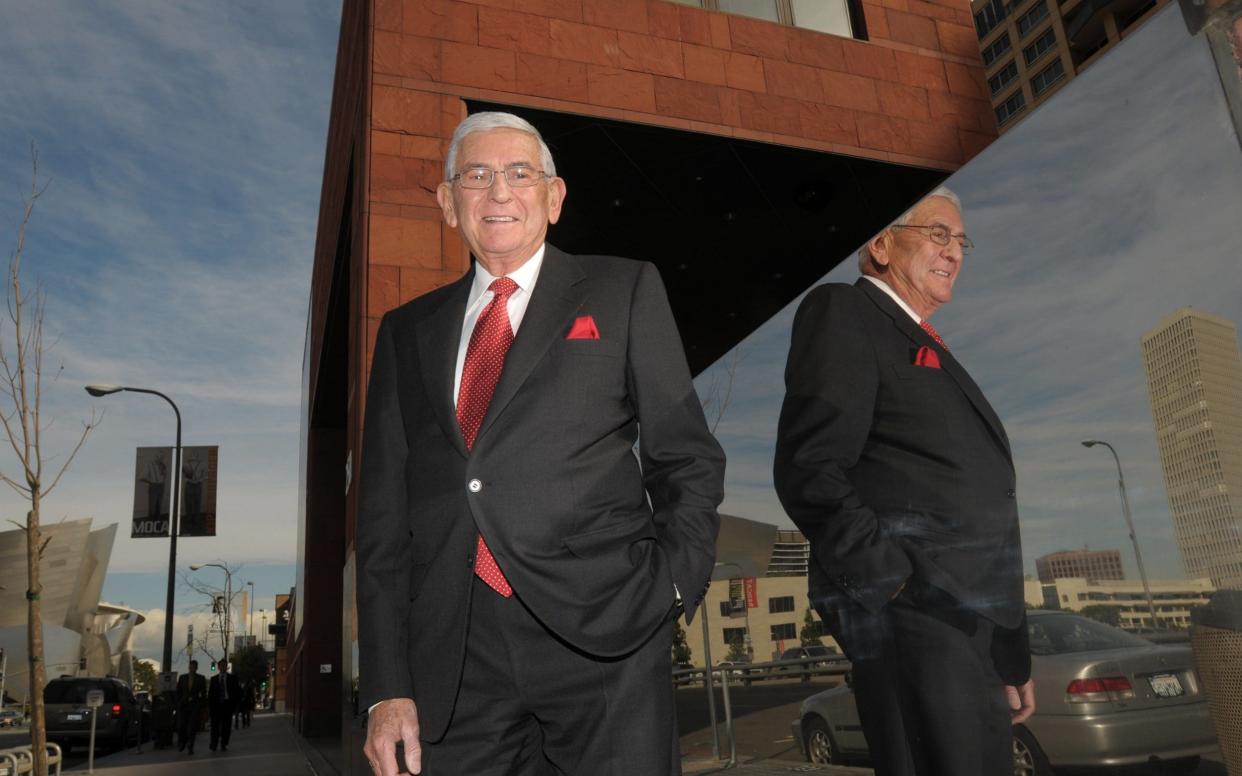
- Oops!Something went wrong.Please try again later.
- Oops!Something went wrong.Please try again later.
Eli Broad, who has died aged 87, was a billionaire entrepreneur and philanthropist whose vision and riches significantly shaped the urban and cultural landscape of Los Angeles.
A New Yorker by birth, and a Midwesterner thereafter, Broad – pronounced to rhyme with “toad”, not “fraud” – moved to California in the late 1960s after making a fortune in house building. He then proceeded to make another in financial services.
By the early 2000s, Broad was reputedly the city’s third richest resident, sandwiched between the media magnate Sumner Redstone and the music mogul David Geffen. In 2017 his wealth was estimated at $6.7 billion (£6 billion).
It would have been higher still but for the $4 billion that he and his wife Edythe had by then channelled into good causes, notably medical research and education. The genomics programme at Harvard and MIT, with a particular focus on inflammatory bowel disease, alone received $700 million.
Broad also poured hundreds of millions of dollars into schemes to improve public schooling and to fund universities, especially his own alma mater, Michigan State. Yet for most Angelenos, his impact was most evident in the arts.
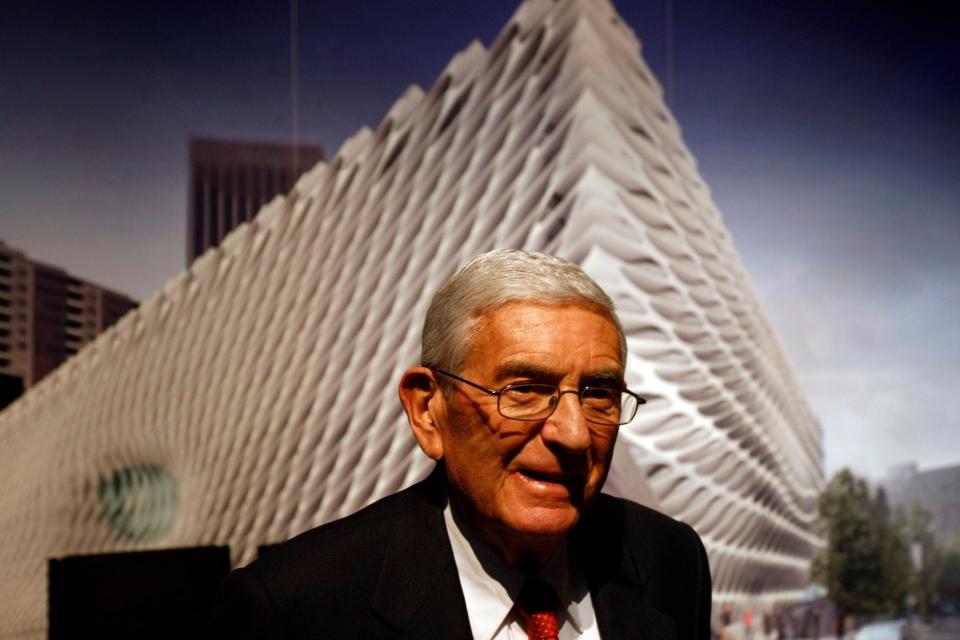
The city is often accused of lacking civic leadership, in part because the leading members of its main industry – entertainment – tend to put their energy into less localised commitments. For instance, Los Angeles only acquired a dedicated art museum (referred to as LACMA) in the mid-1960s.
In 1979, Broad became the founding chairman of its first contemporary art museum, MOCA. He subsequently helped it acquire the core of its collection – 80 Expressionist and pop paintings previously owned by Giuseppe Panza di Biumo – and in 2008 gave it $30 million to avert a financial crisis.
It had been Broad’s wife who initially became interested in art as she browsed the city’s galleries while finding her feet in LA. The couple began to build a collection of their own, starting with works by Van Gogh and Picasso, and then those of more contemporary artists.
In 1995, Broad bought a Roy Lichtenstein painting for $2.5 million using his credit card. He donated the air miles he acquired in so doing to students (although he later revealed that he had paid by card in order to continue earning interest on the money until the bill fell due).
A decade later, he spent $23.8 million – then the highest price paid for a work of contemporary art – on Cubi XXVIII, a steel sculpture by David Smith. Broad was also one of the principal patrons of the artist Jeff Koons.
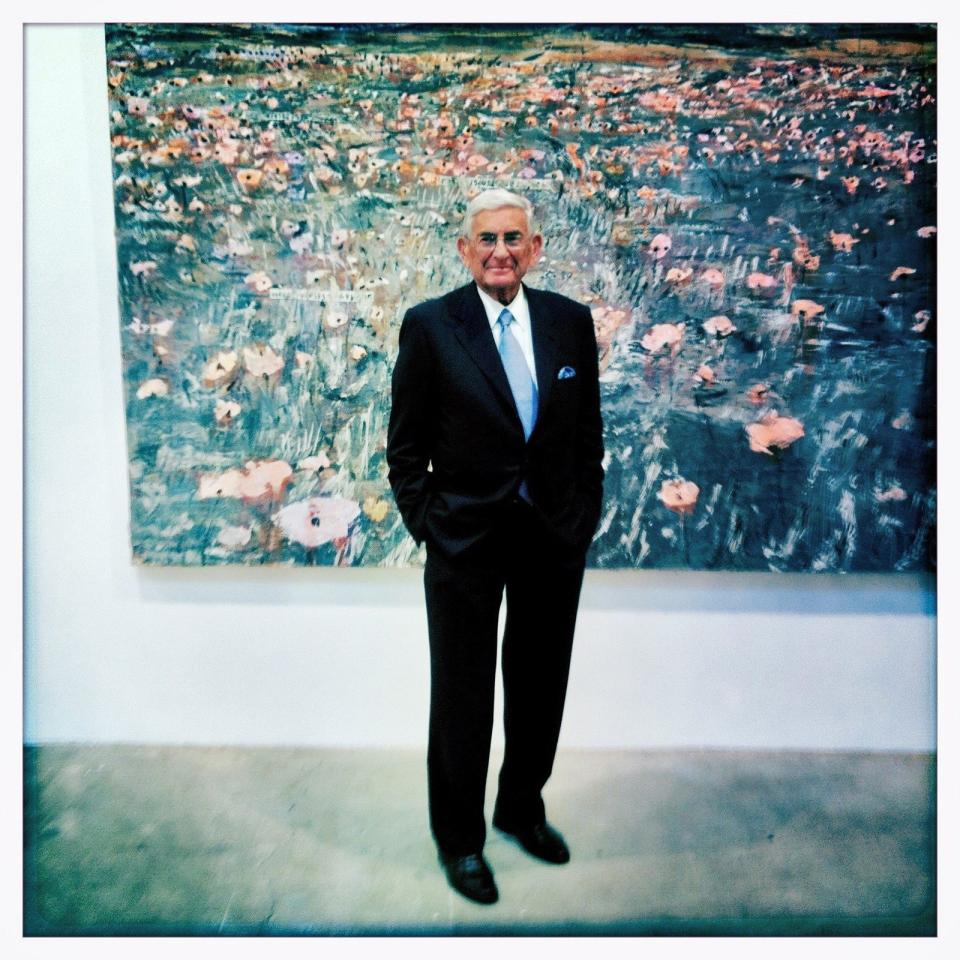
LACMA hoped that Broad would leave it his collection, but despite his giving it $60 million towards its rebuilding in 2008, it was to be disappointed. For Broad saw himself as a latter-day Baron Haussmann, the shaper of modern Paris, or Andrew Haswell Green, who planned New York’s layout, injecting new life into Los Angeles’s moribund downtown area.
His efforts were central to the much-delayed completion there in 2003 of the Walt Disney Concert Hall. Then in 2015, across the street, he opened his own museum, The Broad, to display 2,000 items in his art collection. Critics were divided as to the quality of that and the building alike, although in its first few years it has attracted some 2.5 million visitors.
Altogether, Broad put more than $1 billion into Los Angeles’ arts institutions, though there was an additional cost in personal relations. Broad’s 2012 memoir was entitled The Art of Being Unreasonable, and his controlling tendencies led to abrupt arrivals and departures of museum directors and ferocious feuds with leading architects.
The most celebrated of these was with Frank Gehry, whom Broad commissioned to design a house, only for the two to fall out over its cost halfway through the project. Broad paid another firm to complete the build. The pair also butted egos over the Disney Concert Hall, eventually burying their differences in order to see it realised.
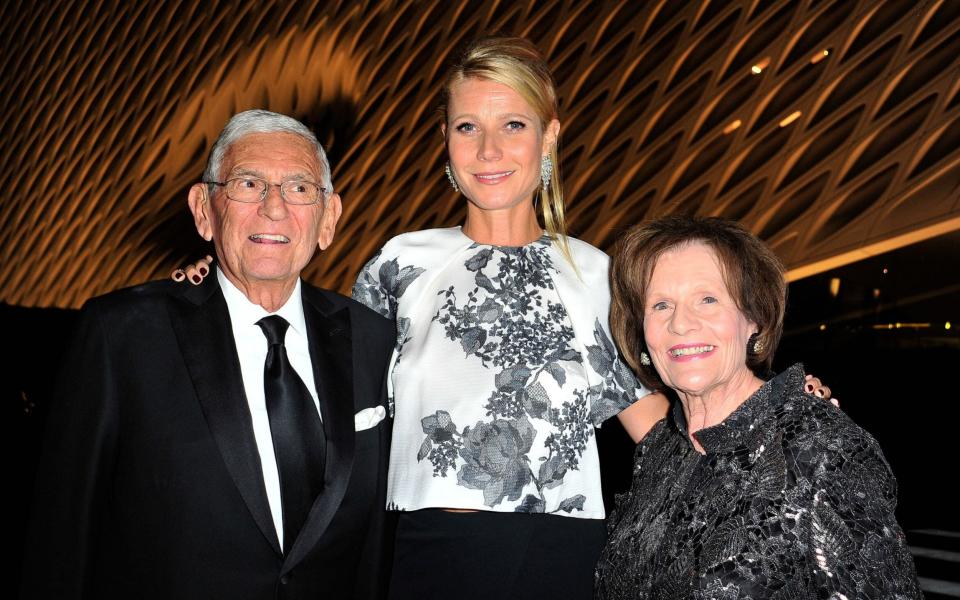
“Let’s move on,” was Broad’s favoured way of indicating that he was not open to further negotiation of a decision. Even his fellow tycoons would complain to Edythe Broad during fund-raising campaigns that he treated them like staff. (“He treats everyone like that,” came the reply.)
For all his public largesse, guests aboard his private jet would be offered packaged sandwiches. As it is, Broad’s legacy remains to be evaluated, with many Angelenos believing that the very wealthy should no longer have such power to shape the city in their own image.
Broad himself was unmoved by such considerations. “The best thing to do is follow the advice that reasonable people maintain the status quo – those who are unreasonable make changes,” he claimed. “I have yet to meet a scientist who wants to maintain the status quo.”
An only child, Eli Broad was born in the Bronx on June 6 1933. His parents were Jewish immigrants from Lithuania. The family name was in fact spelt Brod, pronounced like the US slang for a woman; years of taunts as a child led Eli later to change it.
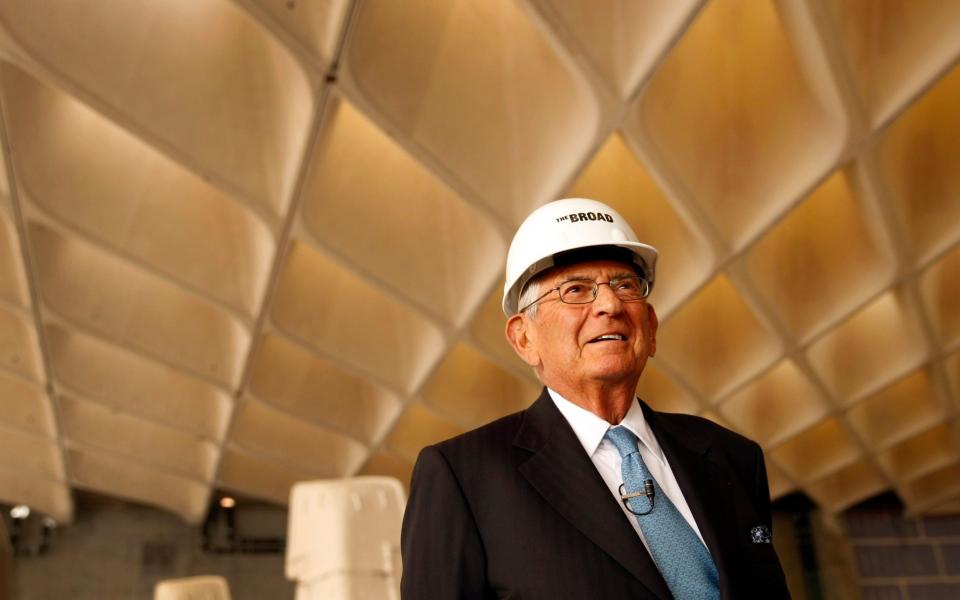
His father was a house painter but after the family moved to Detroit shortly before the Second World War, he ran a five-and-dime store. Eli’s mother was a dressmaker. At Michigan State University, Eli studied Accountancy, paying his tuition himself with jobs which included working on the Packard assembly line. His record as the youngest person in the state to qualify as an accountant stood until 2010.
While doing the books of local building firms, Broad compared unfavourably his intelligence and income with that of his clients. Accordingly, in 1956 he suggested to the husband of his wife’s cousin, Donald Kaufman, a house-builder, that they go into business together, with Broad handling the finances.
Their strategy centred on reducing costs by building starter homes with carports instead of basement garages. Construction could be completed within a week and the houses were priced so that a mortgage cost less than renting a two-bedroom apartment.
Broad pitched the design at customers under the name “Award Winner”, though it had won no prizes. Within five years, the pair were millionaires, and within a decade the company was one of the largest housebuilders in the country and the first to list on the New York Stock Exchange.
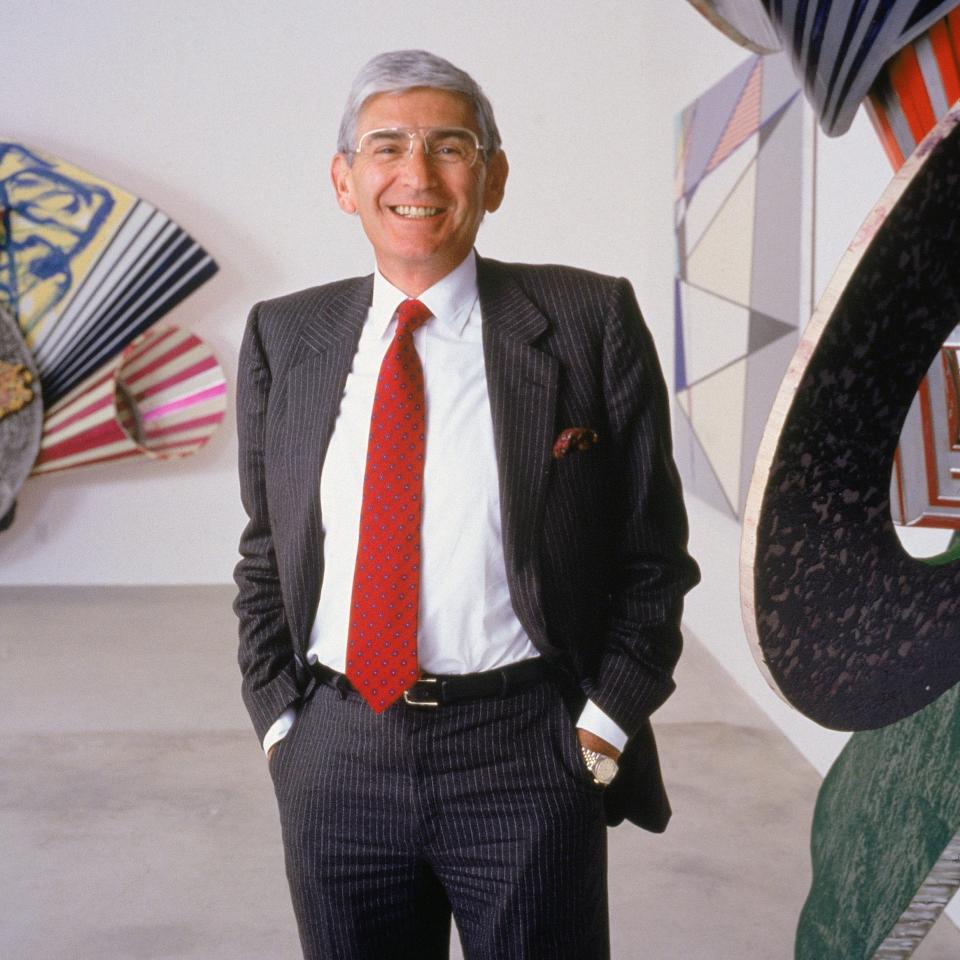
Worried that Detroit was too dependent on the car industry, Broad moved the business to Arizona and then to California by the mid-1960s. In 1971, as a hedge against any downturn, Broad bought an American insurance company, Sun Life (not to be confused with the Canadian giant), which he renamed SunAmerica.
His masterstroke was to refocus it as a vehicle catering to the savings and pensions needs of the ageing generation of baby-boomers. In 1989, Broad took it public and in 1998 sold it to AIG, the insurance behemoth, for $17.8 billion, netting $3 billion for himself (about £3.2 billion now). The following year – when he was still putting in 80-hour weeks in his late sixties – he stepped down as chairman to devote himself to philanthropy.
He married, in 1954, Edythe Lawson. In his memoir he admitted few regrets, except perhaps having made his two sons spend their weekends as children visiting subdivisions of his businesses. They and his wife survive him.
Eli Broad, born June 6 1933, died April 30 2021

